|
Books Should Be Free Loyal Books Free Public Domain Audiobooks & eBook Downloads |
|
|
Books Should Be Free Loyal Books Free Public Domain Audiobooks & eBook Downloads |
|
Literature |
|---|
|
Book type:
Sort by:
View by:
|
By: George MacDonald (1824-1905) | |
|---|---|
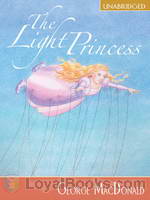 The Light Princess
The Light Princess
A king and queen are in despair. After years of marriage, they are yet to be blessed with a child. Finally a lovely daughter is born to them. They plan a grand christening ceremony for the baby, but as destiny would have it, they forget to invite the nastiest lady in the kingdom, who also happens to be the king's sister, the evil Princess Makemnoit. Now if all that seems distinctly familiar to you, it was meant to! Using the Sleeping Beauty/Briar Rose fairytale as a starting point, Scottish writer George MacDonald creates a story that's even more enchanting and gives it a nice little twist... | |
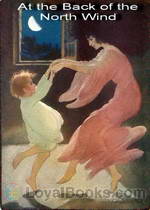 At the Back of the North Wind
At the Back of the North Wind
Written by the man who mentored Lewis Carroll and encouraged him to submit Alice for publication, At the Back of the North Wind is today a forgotten classic of Victorian children's literature. The story tells of a young boy named Diamond, the son of a coachman in an English country mansion. Diamond sleeps in the hayloft above the stables and at night he finds he's disturbed by the wind blowing through the holes in the wall. He tries to plug them but one night, he hears an imperious voice scolding him for doing this! It is the magnificent North Wind that speaks to him and tells him that he's closed up her windows... | |
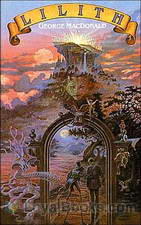 Lilith
Lilith
A fantasy novel first published in 1895, Lilith follows a young man on his inter-dimensional journey of spiritual discovery, as he acquaints himself with his family’s past and unearths a life-changing secret. Moreover, it deals with the introspection of its protagonist, as he is hurled into a mysterious setting where he encounters bizarre creatures that challenge the validity of his temporal values. Examining issues including the essence of life, wisdom, death, redemption, and salvation, the novel presents a masterfully woven plot that marks the piece as one of MacDonald’s darkest and most intense contributions to the fantasy genre... | |
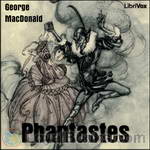 Phantastes
Phantastes
A young man named Anodos experiences dream-like adventures in Fairy Land, where he meets tree-spirits, endures the presence of the overwhelming shadow, journeys to the palace of the fairy queen, and searches for the spirit of the earth. The story conveys a profound sadness and a poignant longing for death. (Brad Powers) | |
 David Elginbrod
David Elginbrod
David Elginbrod was George Macdonald’s first real success, a novel of Scottish country life. Published in 1862, it was dedicated to the memory of Lady Noel Byron. | |
 The Lost Princess (or A Double Story, or The Wise Woman)
The Lost Princess (or A Double Story, or The Wise Woman)
Also known as "A Double Story" or "The Wise Woman."The story of two very spoiled girls, a princess and a peasant, who are kidnapped by a strange woman for a lesson in life. They may not emerge the same... but will their parents be changed for the better too? | |
 Robert Falconer
Robert Falconer
A Victorian novel devoted to beloved character first introduced to readers in MacDonald's David Elginbrod. | |
 Diary of an Old Soul
Diary of an Old Soul
George MacDonald, a Scottish pastor, wrote these short poems, one for each day of the year, to help him with the severer misfortune he was experiencing. The poems are filled with hope and promises of Christ, yet, he also writes about his doubts. These poems are wonderful to listen to for people of any religion. | |
By: George Manville Fenn (1831-1909) | |
|---|---|
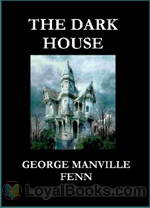 The Dark House
The Dark House
An extremely wealthy but reclusive man has died, leaving an eccentric will which hints at great riches hidden somewhere in the house. Most of the people at the reading of the will did not know the deceased in person, but had received kindnesses from him, for instance by the payment of school and university fees. The principal beneficiary, a great-nephew, also did not know him. The only two people who really knew him were the old lawyer who dealt with his affairs, and an old Indian servant. Yet when the will had been read, and they all went to where the treasure–gold, jewels and bank-notes–were supposed to be hidden, nothing could be found. | |
By: George Meredith (1828-1909) | |
|---|---|
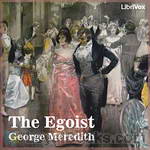 The Egoist
The Egoist
The Egoist is a tragicomical novel by George Meredith published in 1879. The novel recounts the story of self-absorbed Sir Willoughby Patterne and his attempts at marriage; jilted by his first bride-to-be, he vacillates between the sentimental Laetitia Dale and the strong-willed Clara Middleton. More importantly, the novel follows Clara’s attempts to escape from her engagement to Sir Willoughby, who desires women to serve as a mirror for him and consequently cannot understand why she would not want to marry him... | |
 The Shaving of Shagpat
The Shaving of Shagpat
The novel is a humorous oriental romance and allegory written in the style of the Arabian Nights. Like its model, it includes a number of stories within the story, along with poetic asides.“The variety of scenes and images, the untiring evolution of plot, the kaleidoscopic shifting of harmonious colours, all these seem of the very essence of Arabia, and to coil directly from some bottle of a genie. Ah! what a bottle!” -Edmund Gosse in Gossip in a Library | |
By: George Moore (1852-1933) | |
|---|---|
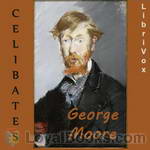 Celibates
Celibates
The author is considered the first great Irish writer of realist fiction and is said to have been an inspiration for James Joyce. Celibates is a novel of three characters: Mildred Lawson, John Norton and Agnes Lahens.They have nothing in common other than an absolute love of themselves and an inability to sympathize with others. In that vein, it constitutes a striking image of our own modern day self-absorbed society. (Introduction by James Carson) | |
By: George Payne Rainsford James (1799-1860) | |
|---|---|
 Forgery
Forgery
Humphrey Scriven is a fine, genial, mercantile man, left widowed to raise three daughters and a son. Two of the daughters marry well although happiness is not enduring. The other defers her marriage, knowing her father disapproves of her choice. The son is a disappointment to his father -- his character is not as generous or kind. However, in time, this son inherits the business, with the exception of a portion left to a trusted clerk, Mr. Hayley. But there is a secret side to Mr. Hayley and maybe he is not quite the right man to guide the novice merchant. The two part ways acrimoniously and the clerk is driven to actions for which his son pays dearly. | |
 Huguenot: A Tale of the French Protestants
Huguenot: A Tale of the French Protestants
The time of French king Louis XIV was a time of religious conflict. His father, Louis XIII had tried to suppress the teachings and followers of Calvin but was thwarted by his ministers. The son took a different path. The king was Catholic, and although he was tolerant of others, some in his government were less so, and persecuted the Protestant Huguenots. This is the story of Albert, Count of Morseiul as he treads the tightrope of being a Huguenot landowner and loyal subject and friend of the king. | |
By: George Pope Morris (1802-1864) | |
|---|---|
 Will Nobody Marry Me?
Will Nobody Marry Me?
In addition to his publishing and editorial work, Morris was popular as a poet and songwriter; especially well-known was his poem-turned-song "Woodman, Spare that Tree!" His songs in particular were popular enough that Graham's Magazine in Philadelphia promised Morris $50, sight unseen, for any work he wanted to publish in the periodical. | |
By: George Sand (1804-1876) | |
|---|---|
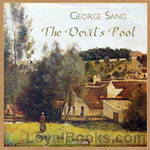 The Devil's Pool
The Devil's Pool
George Sand (the pen name of Amantine-Lucile-Aurore Dupin 1804-1876) is famous for flaunting the conventions of behavour expected of women of her standing in France at the time and for her numerous romantic liaisons including her long standing affair with Frédéric Chopin. The Devil’s Pool (published in 1846 as La Mare au Diable) is one of several short pastoral novels drawn from her childhood experiences in the rural French region of Berri. It tells the story of a young widower, Germain, who, at the insistence of his father-in-law, sets out to remarry so that he will have someone to help raise his three young children. Summary written by the reader. | |
By: George Sylvester Viereck (1884-1962) | |
|---|---|
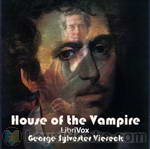 The House of the Vampire
The House of the Vampire
The House of the Vampire is a 1907 novella that is a very unusual vampire story. A young writer comes under the powerful influence of a mysterious older master, who seems to have left a trail of ruined proteges in his wake. The story is as much about the nature of artistic creation as it is a chilling vampire tale. | |
By: George W. Ogden (1871-1966) | |
|---|---|
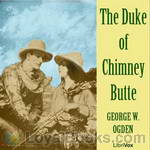 The Duke of Chimney Butte
The Duke of Chimney Butte
An exciting tale of gun play, brave deeds and romance as Jerry Lambert, the “Duke” tries to protect the ranch of the lovely and charming Vesta Philbrook from thieving neighbors and other evil doers. | |
By: George Washington Cable (1844-1925) | |
|---|---|
 Bonaventure, A Prose Pastoral of Acadian Louisiana
Bonaventure, A Prose Pastoral of Acadian Louisiana
This is a gentle, delightful story of life and love on the bayoux of Acadian Louisiana during the latter half of the 19th century. Bonaventure is a Creole raised among the Acadians. He loves learning, and through his calling as a teacher, and his own unique force of character, comes to have a lasting effect on the people around him. A word of warning: This story has occasional references to Jews and African Americans that the modern mind finds offensive. They are retained here in the interest of preserving the original text. | |
By: George Wharton Edwards (1859-1950) | |
|---|---|
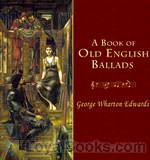 A Book of Old English Ballads
A Book of Old English Ballads
In this selection... the aim has been to bring within moderate compass a collection of these songs of the people which should fairly represent the range, the descriptive felicity, the dramatic power, and the genuine poetic feeling of a body of verse which is still, it is to be feared, unfamiliar to a large number of those to whom it would bring refreshment and delight. | |
By: Geraldine Hodgson (1865-1937) | |
|---|---|
 English Literature
English Literature
This book is not meant to be a History of English Literature, but an introduction for those who do not know much about it, or who may be thinking of it as a "dull, horrid thing" which they have to learn in school. I venture to hope that this book may become too dear to throw away when the study is done, and overall I have tried very hard not to write a "stuffy" book. Summary by Beth Thomas and the Introduction | |
By: Gertrude Atherton (1857-1948) | |
|---|---|
 Rezanov
Rezanov
This novel by the prolific Californian author Gertrude Horn Atherton is based on the real life story of Nikolai Rezanov, a man who, in 1806, pushed for the Russian colonization of Alaska and California. "Not twenty pages have you turned before you know this Rezanov, privy councilor, grand chamberlain, plenipotentiary of the Russo-American company, imperial inspector of the extreme eastern and northwestern dominions of his imperial majesty Alexander the First, emperor of Russia—all this and more, a man... | |
 Valiant Runaways
Valiant Runaways
Savage bears, a river rescue, capture by Indians, escape on wild mustangs and a revolutionary battle await the protagonists of this suspenseful adventure novel, set in California. | |
 Sleeping Fires
Sleeping Fires
The story of a love so strong that neither the rigid rules of Society in California in the 1800s nor the very bowels of hell could keep a young woman from the love she had found. A story rich in fashion ad feminism showing how determination and love could overcome all obstacles. | |
 Senator North
Senator North
"When, Mr. President, a man, however eminent in other pursuits and whatever claims he may have to public confidence, becomes a member of this body, he has much to learn and much to endure. Little does he know of what he will have to encounter. He may be well read in public affairs, but he is unaware of the difficulties which must attend and embarrass every effort to render what he may know available and useful. He may be upright in purpose and strong in the belief of his own integrity, but he cannot... | |
By: Gertrude Christian Fosdick (1861-1961) | |
|---|---|
 Out of Bohemia: A Story of Paris Student-Life
Out of Bohemia: A Story of Paris Student-Life
Beryl Carrington is a naïve young American artist following her ideals to Paris, where she meets three young men, all also artists and all in love with her. Georges is French-American and a bit wild, with a French mistress on the side. Clayton is a true-hearted human being as well as a single-minded painter, with room for little in his life besides Art. Harold is more of a bourgeois Bohemian, coming from upper-class New York society but also a gifted and devoted painter with dreams of greatness... | |
By: Giacomo Leopardi (1798-1837) | |
|---|---|
 Poems of Giacomo Leopardi
Poems of Giacomo Leopardi
This is a volume of poems by Giacomo Leopardi. | |
By: Giambattista Basile (1566 or 1575-1632) | |
|---|---|
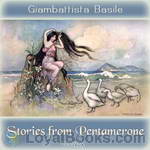 Stories from Pentamerone
Stories from Pentamerone
This is one of the oldest written collections of fairy tales. Although the names are different, listeners should recognise many of the stories as the basis of modern fairy tales. Be warned however, that these stories are a lot more violent and gruesome then the Disney versions you may be familiar with. Parents should listen to the files to gauge their suitability before allowing children to listen to them. | |
By: Gideon Wurdz (b. 1875) | |
|---|---|
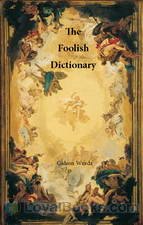 The Foolish Dictionary
The Foolish Dictionary
“The Foolish Dictionary” was written by “Gideon Wurdz” and was published in 1904. According to the beginning of the book, it is “An exhausting work of reference to un-certain English words, their origin, meaning, legitimate and illegitimate use…” This a a short but amusing dictionary which “redefines” words in some interesting ways. Funny and sometimes bizarre observations are sprinkled throughout. In keeping with the policy to read, rather than attempt to rewrite, books – even those with offensive content – nothing has been omitted... | |
By: Gilbert Parker (1862-1932) | |
|---|---|
 The Right of Way
The Right of Way
Charley Steele is a successful and brilliant Canadian lawyer. He has a nagging wife, Kathleen, and a lazy brother-in- law, Billy. In spite of his success, he is disillusioned with his life, drinks too much, and is deeply troubled by his agnosticism which leads to trouble and confusion. When Billy embezzles money, Charley discovers the theft and sets out to make things right. Charley however, ends up in a waterfront saloon where he encounters a barroom brawl and becomes unconscious. Charley loses his memory and ends up in the Canadian Northwoods where he falls in love with a pretty postmistress, Rosalie... | |
 Seats of The Mighty
Seats of The Mighty
| |
By: Giovanni Boccaccio (1313-1375) | |
|---|---|
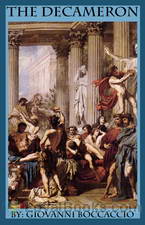 The Decameron
The Decameron
Giovanni Boccaccio’s The Decameron is a collection of novellas or short novels written during the 14th century. There are 100 tales contained in the book which is presented together. The book’s title The Decameron combines the two Greek words “deka” meaning ten and “hemera” meaning day. The title can be literally translated as “ten day,” which is also the time frame in which the stories are told by the 7 young women and 3 young men. In the book, each of the ten persons took their turns to tell stories for a day... | |
By: Giovanni Verga (1840-1922) | |
|---|---|
 Under the Shadow of Etna: Sicilian Stories
Under the Shadow of Etna: Sicilian Stories
The short stories of Giovanni Verga, one of the leading authors of Italian verismo, or realism, tell mostly of working-class characters in rural, 19th-century Sicily. One of these stories, "Rustic Chivalry," or "Cavalleria rusticana," was the basis for the opera of the same name by Mascagni. | |
By: Godfrey Sweven (1845-1935) | |
|---|---|
 Riallaro: The Archipelago of Exiles
Riallaro: The Archipelago of Exiles
John Macmillan Brown was born in New Zealand and a University professor, wrote under the pseudonym Godfrey Sweven. An excerpt from the Introduction: "Absorbed in contemplation of its sublimity, I sat for a moment on a rock that rose out of the bush. I almost leapt from it, startled; a voice, unheralded, fell like a falling star through the soundless air. I had heard no footstep, no snap of trodden twig or rustle Of reluctant branch. My senses were so thrilled with the sound that its purport shot past them. There at the base of the rock stood the strangest figure that ever met my eyes." - Summary by Kirk202 | |
 Limanora, The Island Of Progress
Limanora, The Island Of Progress
Our ethereal man with wings, whom we met in Riallaro, continues his tale about Limanora which is a Utopian Island created as an experiment in Eugenics. Medical and technological advances have led to a central Power Source, computers, and weather control to name a few. - Summary by kirk202 | |
By: Grace Isabel Colbron (1869-1943) | |
|---|---|
 The Case of the Golden Bullet
The Case of the Golden Bullet
Joseph Muller, quiet mannered detective, tries to solve the mystery of a man who died in his study, by a bullet hole in the chest. But all windows and doors were locked, from the inside. | |
 The Case of the Pool of Blood in the Pastor’s Study
The Case of the Pool of Blood in the Pastor’s Study
Joseph Muller, police detective, travels to a remote Hungarian village to discover the truth behind the murder of a beloved village Pastor. (Introduction by Dawn) | |
By: Grace Livingston Hill (1865-1947) | |
|---|---|
 Cloudy Jewel
Cloudy Jewel
Julia Cloud, the oldest--and most responsible--child of her family, helped raise her four siblings due to their mother's long-time illness and father's death. After faithfully nursing two ill brothers (who died), she then cared for her invalid mother for many years. When Julia's mother passes on, her only surviving sibling Ellen fully expects--and nearly demands--that her spinster sister come live with her family. But to earn her keep, Julia must be their live-in housekeeper and babysitter for Ellen's four children. But Julia's college-age niece and nephew arrive unexpectedly from California and offer Aunt Cloudy Jewel a surprise opportunity she never expected in her wildest dreams. | |
 Marcia Schuyler
Marcia Schuyler
A compelling love triangle. Marcia is young & sweet. Her older sister Kate is vain & selfish. Marcia deeply admires the man that Kate is to marry: handsome & respected David Spafford. But on the eve of the wedding, Kate elopes with another man. Marcia is there when the note is found...the note that effectively breaks David's heart. Out of pity for his situation, Marcia offers to take Kate's place, in order to save David from humiliation. She grows in love for him, all the while aware that he's still grieving for his lost Kate. What will happen when Kate returns, fully intending to get David back? Will Marcia have the strength to fight for the man she now loves? | |
 City of Fire
City of Fire
Home from college, Lynn is heartbroken to find her childhood friend Mark, has fallen away from his faith in God. After making some poor life choices, Mark is caught up in a local scandal. Billy, one of the bright young boys from Lynn's Sunday School class, is determined to clear Mark's name. But at what cost? And will Billy's betrayal hurt the people he's trying to protect? - Summary by Emily Grace | |
By: Grant Allen | |
|---|---|
 The Woman Who Did
The Woman Who Did
Most times, especially in the time when this book was written (1895), it is just as nature and society would wish: a man and woman “fall in love” and get married. But it is not so for Herminia Barton and Alan Merrick. They do indeed fall in love, but Herminia has a deeply held belief in freedom for women, and she holds immutable views against what she perceives as the slavery of marriage.Alan unwillingly agrees to her strong wish to remain unmarried and to live together as “close and dear friends”... | |
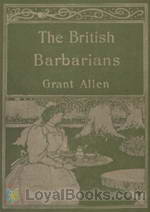 The British Barbarians
The British Barbarians
After Civil Servant Philip Christy crosses paths with the mysterious Bertram Ingledew in the respectable suburb of Brackenhurst, Philip and his sister Frida, married to the wealthy Scot Robert Monteith, become friends with the stranger. Bertram has some unconventional concepts about society, and as the story unfolds, his beliefs and actions cause much disruption in the family and the neighbourhood.Who is Bertram? Where does he come from? Allen explores some interesting ideas about society, some of which are curiously relevant today... | |
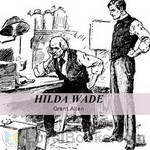 Hilda Wade, A Woman With Tenacity of Purpose
Hilda Wade, A Woman With Tenacity of Purpose
In this early detective novel, the detective is Hilda Wade. She is a very capable nurse, but there is something mysterious about her from the moment she arrives at the hospital. Upon meeting her, Dr. Hubert Cumberledge greatly admires her and becomes a devoted friend. It turns out that Hilda has one purpose in life, and in pursuit of that purpose she will travel across the world, from London to South Africa, Rhodesia, India, Nepaul, Tibet and back. With Cumberledge's support, her extraordinary logic and clear thinking lead her on through deadly perils. But will that be enough to accomplish the secret purpose which has driven her so long and so far? | |
By: Grazia Deledda (1871-1936) | |
|---|---|
 After the Divorce
After the Divorce
Giovanna and Costantino Ledda are a happily married couple living with their young child in a Sardinian country village close to their extended family. Costantino is wrongly convicted of murdering his wicked uncle and with no way of supporting herself, Giovanna reluctantly divorces him and is driven to marry Brontu Dejas, a wealthy but brutish drunkard who has always lusted after her. As well as enduring a marriage amounting to slavery, Giovanna is derided by villagers for having two husbands... | |
By: Gustave Flaubert (1821-1880) | |
|---|---|
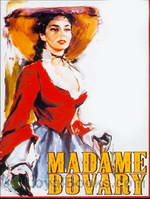 Madame Bovary
Madame Bovary
The strands woven together in Gustave Flaubert's famous, path breaking 1856 novel Madame Bovary include a provincial town in Normandy, France, a shy young doctor with an indifferent career and a lovely young woman who lives in a fantasy world based on the innumerable romantic novels she reads. Of course there is also the story of a dull marriage punctuated by passionate, adulterous love affairs. First published in serial form in a Parisian magazine and deemed to be the “perfect” novel, Flaubert's debut was received by both readers and critics with acclaim and admiration... | |
 Three Short Works
Three Short Works
Here is a collection of strikingly different pieces by Flaubert: a prose poem in the voices of Death, Satan and Nero; the trials and apotheosis of a medieval saint; and the life of a selfless maid in 19th century France. Each exhibits the vigorous exactness, and the mixture of realism and romanticism, for which Flaubert is renowned. | |
 Salammbô
Salammbô
After completing the famous Mme Bovary, Flaubert put all his efforts into researching the Punic Wars and completed the lesser known Salammbô. In this volume, Flaubert describes in detail the Mercenary Revolt and the fight of the Mercenaries against the all-powerful Carthage, the theft of the magical Zaimph and the love and hate between the Carthaginian princess Salammbô and the fiercest leader of the Mercenaries, Matho. | |
 Temptation Of St. Anthony
Temptation Of St. Anthony
An extraordinary work of the aesthetic imagination, cast in the form of a psycho-drama detailing the events of one night in the life of the aged hermit, later Saint, Anthony, in the course of which his claims to sainthood are severely tested by, among other things, Gods, Magicians, Science, Food, Monstres, Lust and Death. Beautifully translated by Lafcadio Hearn, justly celebrated for his eerie re-tellings of Japanese ghost stories and legends, it boasts equally extraordinary printworks by renowned symbolist artist Odilon Redon. - Summary by Tony Addison | |
By: Guy Boothby (1867-1905) | |
|---|---|
 Bid For Fortune; Or, Dr Nikola's Vendetta
Bid For Fortune; Or, Dr Nikola's Vendetta
Guy Newell Boothby (1867 – 1905) was a prolific Australian writer. He moved to London in 1894 and became most well-known for his Dr.Nikola mysteries. This book is the first in a series of five and introduces the good doctor himself. Dr Nikola Is a criminal mastermind with an occult twist and like much fiction of that era this book and the following are more about how others fall under his spell and into his web. Here we have an adventure and love story that sweeps us from Australia, the South Seas, the Middle East and rural Hampshire with our lovestruck hero constantly battling against Dr Nikola and his cohorts... | |
By: Guy de Maupassant (1850-1893) | |
|---|---|
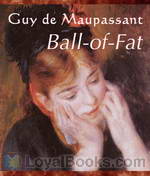 Ball-of-Fat
Ball-of-Fat
The first significant published short story of French author Guy de Maupassant, and generally acknowledged as his greatest work, “Ball-of-Fat” (French title: Boule de Suif) is the touching story of an interrupted coach ride from Rouen to Le Havre during which occurs the corruption of a principled prostitute by immoral and hypocritical members of the upper class. The story is set during the occupation of Rouen at the time of the Franco-Prussian War. | |
 Bel Ami, or The History of a Scoundrel
Bel Ami, or The History of a Scoundrel
“He had faith in his good fortune, in that power of attraction which he felt within him - a power so irresistible that all women yielded to it.”Though firmly set in 1880s Paris, Maupassant's gripping story of an amoral journalist on the make could, with only slight modifications of detail, be updated to the 1960s, to the Reagan-Thatcher years, or maybe to the present day. Anti-hero Georges Duroy is a down-at-heel ex-soldier of no particular talent. Good-looking but somewhat lacking in self-confidence, he discovers an ability to control and exploit women - whereupon his career in journalism takes off, fuelled by the corruption of colleagues and government arrivistes... | |
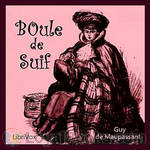 Boule de Suif
Boule de Suif
Boule de Suif (1880) is a short story by the late-19th century French writer Guy de Maupassant. It is arguably his most famous short story, and is the title story for his collection on the Franco-Prussian War, entitled "Boule de Suif et Autres Contes de la Guerre" ("Boule de Suif and Other Stories of the War"). John Ford said that his film Stagecoach was in many ways a western rewrite of Boule de Suif. | |
By: Guy Wetmore Carryl (1873-1904) | |
|---|---|
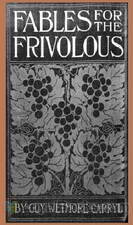 Fables for the Frivolous
Fables for the Frivolous
The Urban Rat and the Suburban Rat, The Persevering Tortoise and the Pretentious Hare, The Ambitious Fox and the Unapproachable Grapes.... If some of these titles seem vaguely familiar to you, you wouldn't be mistaken! Fables for the Frivolous by Guy Wetmore Carryl contains some well-known fables in a modern packaging, with a delightful new twist! The complete title of the original published in 1898 was Fables for the Frivolous (With apologies to La Fontaine) and it was the first published work of this gifted American journalist, humorist and poet... | |
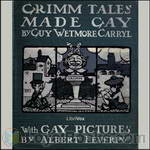 Grimm Tales Made Gay
Grimm Tales Made Gay
A comic rendering in verse of well-loved Fairy Tales of the Brothers Grimm, each ending with a moral and full of puns. The titles of the tales themselves make another verse. | |
By: H Rider Haggard | |
|---|---|
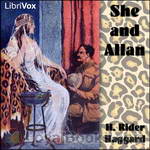 She and Allan
She and Allan
H Rider Haggard’s “She and Allan”, first published in 1921 is a gripping adventure about Allan Quatermain, who together with Hans, the Hottentot and, the Zulu-Chief Omslopogaas and at the bidding of the old Witch Doctor Zikali seeks out Ayesha, the daughter of Isis to find answers to their questions about life and death, and their many, sometimes strange, Adventures on their way. Written by Lars Rolander | |
By: H. Beam Piper (1904-1964) | |
|---|---|
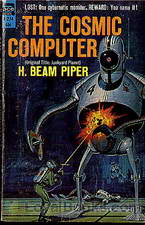 The Cosmic Computer
The Cosmic Computer
Conn Maxwell returns from Terra to his poverty-stricken home planet of Poictesme, “The Junkyard Planet”, with news of the possible location of Merlin, a military super-computer rumored to have been abandoned there after the last war. The inhabitants hope to find Merlin, which they think will be their ticket to wealth and prosperity. But is Merlin real, or just an old rumor? And if they find it will it save them, or tear them apart? | |
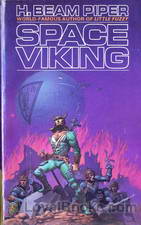 Space Viking
Space Viking
A galactic war has left the Terran Federation in ruins. Formerly civilized planets have decivilized into barbarism. Space Vikings roam the wreckage, plundering and killing for gain. Lord Lucas Trask of Traskon was no admirer of the Space Vikings, but when murder takes his wife on his wedding day, Trask trades everything he has for his own Space Viking ship and sets out on a galaxy-wide quest for revenge. | |
 Murder in the Gunroom
Murder in the Gunroom
The Lane Fleming collection of early pistols and revolvers was one of the best in the country. When Fleming was found dead on the floor of his locked gunroom, a Confederate-made Colt-type percussion .36 revolver in his hand, the coroner’s verdict was “death by accident.” But Gladys Fleming had her doubts. Enough at any rate to engage Colonel Jefferson Davis Rand—better known just as Jeff—private detective and a pistol-collector himself, to catalogue, appraise, and negotiate the sale of her late husband’s collection. | |
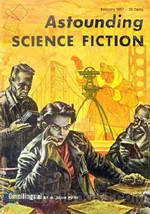 Omnilingual
Omnilingual
An expedition to Mars discovers the remains of an advanced civilization, which died out many thousands of years ago. They recovered books and documents left behind, and are puzzled by their contents. Would the team find their “Rosetta Stone” that would allow them to unlock the Martian language, and learn the secrets of this long-dead race? | |
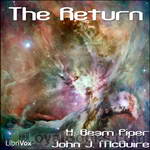 The Return
The Return
Two-hundred years after a global nuclear war, two explorers from a research outpost, that largely survived the cataclysm, discover a settlement of humans who have managed to maintain their civilisation despite ferocious cannibal neighbours, the Scowrers. However, the explorers must turn detective in order to understand the mystery of their hosts philosophy and religion. (Description by Reynard) | |
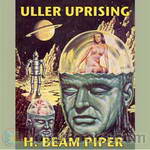 Uller Uprising
Uller Uprising
Uller Uprising is the story of a confrontation between a human overlord and alien servants, with an ironic twist at the end. Like most of Piper’s best work, Uller Uprising is modeled after an actual event in human history; in this case the Sepoy Mutiny (a Bengal uprising in British-held India brought about when rumors were spread to native soldiers that cartridges being issued by the British were coated with animal fat. The rebellion quickly spread throughout India and led to the massacre of the British Colony at Cawnpore.). Piper’s novel is not a mere retelling of the Indian Mutiny, but rather an analysis of an historical event applied to a similar situation in the far future. | |
 Four-Day Planet
Four-Day Planet
Fenris isn't a hell planet, but it's nobody's bargain. With 2,000-hour days and an 8,000-hour year, it alternates blazing heat with killing cold. A planet like that tends to breed a special kind of person: tough enough to stay alive and smart enough to make the best of it. When that kind of person discovers he's being cheated of wealth he's risked his life for, that kind of planet is ripe for revolution. (Introduction from the Gutenberg text) | |
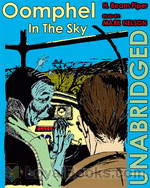 Oomphel in the Sky
Oomphel in the Sky
Natives of the distant planet of Kwannon believe that their world is about to end, and in preparing for the apocalypse, may be unnecessarily bringing about their own demise. The planetary government can’t overcome its own bureaucracy to help them, and the military is overwhelmed. Can a single newsman change the course of a whole people, and save their world? | |
 The Edge of the Knife
The Edge of the Knife
The Terro-Human Future History is Piper’s detailed account of the next 6000 years of human history. 1942, the year the first fission reactor was constructed, is defined as the year 1 A.E. (Atomic Era). In 1973, a nuclear war devastates the planet, eventually laying the groundwork for the emergence of a Terran Federation, once humanity goes into space and develops antigravity technology.The story “The Edge of the Knife” (collected in Empire) occurs slightly before the war, and involves a man who sees flashes of the future. It links many key elements of Piper’s series. | |
 Little Fuzzy
Little Fuzzy
Jack Holloway, a prospector on the planet Zarathustra discovers small furry creatures. These creatures are obviously intelligent, but are they animals or are they sapient? If they are sapient the planet will be declared a protected zone and the company that is developing the planet commercially will lose their exclusive rights to the resources… | |
 Police Operation
Police Operation
H. Beam Piper (1904–1964) was an American science fiction author. He wrote many short stories and several novels. He is best known for his extensive Terro-Human Future History series of stories and a shorter series of “Paratime” alternate history tales. | |
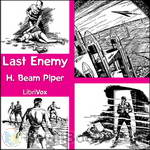 Last Enemy
Last Enemy
An undercover Paratimer has disappeared on assignment while in an alternate time line, and it’s up to Verkan Vall of the Paratime Police to save her. To do so, he must infiltrate a universe in which assassination is an honorable profession, and reincarnation a scientific fact. Will Verkan Vall survive in a world of killers and the undead? | |
 A Slave is A Slave
A Slave is A Slave
The Galactic Empire is slowly 'welcoming' into the family of civilized worlds those systems so far off in the backwater of the galaxy that they have been overlooked and ignored for the past 500 years or so. This is purely routine work because every planet offered the chance has eagerly accepted the invitation. Mainly because the enlightened Empire lets the planetary government continue to rule and do whatever it wants...with a few minor restrictions of course; and because the they are shown what happens to planets who decide not to accept the invitation... | |
 Null-ABC
Null-ABC
"There's some reaction these days that holds scientists responsible for war. Take it one step further: What happens if "book-learnin'" is held responsible ...?" | |
 Temple Trouble
Temple Trouble
I'll bet you did not know that our little earth is not limited to the single time line on which we happen to exist. That's right; There are actually thousands, no many millions of parallel times, each existing alongside all the rest, using the same real estate, but following their own path. Some extremely primitive, some very advanced, but all blissfully unaware of the others. Of course this does not affect us at all, unless ... unless one of these time lines discovers the existence of the others and then a way to move easily back and forth from one to the other... | |
 Time Crime
Time Crime
The Paratime Police had a real headache this time! Tracing one man in a population of millions is easy--compared to finding one gang hiding out on one of billions of probability lines! | |
 Naudsonce
Naudsonce
Naudsonce? What does THAT mean? Well, to find out you will need to listen to this story where Piper's unique mind explores what we mean by 'communication' and how it happens. The joint Space Navy-Colonial Office expedition was looking for new planets suitable for colonization; they had been out, now, for four years, which was close to maximum for an exploring expedition. They had entered eleven systems, and made landings on eight planets. Three had been reasonably close to Terra-type but were all disqualified by terrible animals or warlike inhabitants... | |
By: H. Beam Piper and John J. McGuire | |
|---|---|
 Lone Star Planet
Lone Star Planet
New Texas: its citizens figure that name about says it all. The Solar League ambassador to the Lone Star Planet has the unenviable task of convincing New Texans that a s’Srauff attack is imminent, and dangerous. Unfortunately it’s common knowledge that the s’Srauff are evolved from canine ancestors—and not a Texan alive is about to be scared of a talking dog! But unless he can get them to act, and fast, there won’t be a Texan alive, scared or otherwise! | |
By: H. Beam Piper and John McGuire (1904-1964) | |
|---|---|
 Hunter Patrol
Hunter Patrol
World War IV has dragged on for 12 years and the whole world is drained and tired of the killing and destruction. One man, a high school chemistry teacher from St. Louis in the USA, is serving his latest forced stint in the UN forces when something strange happens to him. He dies but yet he doesn't. What if you had the power to bring peace to the entire world? What would you do? This story explores a frightening and strange journey into the murky depths of human needs and desires and how they can twist and turn back upon us. | |
By: H. De Vere Stacpoole (1863-1951) | |
|---|---|
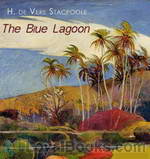 The Blue Lagoon
The Blue Lagoon
Two shipwrecked children grow up on a South Pacific island. This beautiful story of adventure and innocent love was H.D. Stacpoole’s most popular work.Parents who may have seen the Hollywood film need not be anxious about the book's suitability for kids -- the author's treatment of adolescent sexuality is almost mystical and very mild. The story of The Blue Lagoon (1908) continues in The Garden of God (1923) and The Gates of Morning (1925). A ship’s doctor, Henry De Vere Stacpoole (1863–1951) published over 90 works of fiction, poetry, autobiography, and translation. | |
 The Man Who Lost Himself
The Man Who Lost Himself
Best known for his literary work The Blue Lagoon, which has been made into film several times over, H. De Vere Stacpoole’s first publication was a book titled The Intended in 1894. Stacpoole was disappointed at its lack of commercial success, and felt the story was too good to let go. He eventually re-worked the book, culminating in The Man Who Lost Himself, a light-hearted story of a luckless American visiting London on yet another of his failed business ventures, when he happens upon a gentleman of status and wealth, who also just happens to be his exact look-alike. | |
 Beach of Dreams
Beach of Dreams
Two sailors, Harbutt and Raft, discuss their plight as workers under the thumb of a wealthy owner. During a windstorm, Raft and his fellow hands must climb a mast of the three-master to control a rigging gone astray. Once they master that runaway rigging, they pause to watch another vessel in the distance. It's a ship many have seen before. We are introduced to the occupants of this new ship, the Gaston de Paris. The owner is Prince Selm, who loves the finest things in life, yet is drawn to the sea... | |
By: H. G. Wells (1866-1946) | |
|---|---|
 The Island of Dr. Moreau
The Island of Dr. Moreau
One of the first instances of science fiction, Wells’ classic tale published in 1986 examines various controversial philosophical issues active at the time of its publication, most notable being the implications of vivisection and degeneration. Narrated by its everyman protagonist Edward Prendick, the novel follows the events of his stay at a mysterious island, home to ghastly secrets, horrors, and incomprehensible experiences. Furthermore, the novel features innovative themes which have become iconic in the modern science fiction genre, including moral and ethical responsibility, evolution, and man’s interference with the course of nature... | |
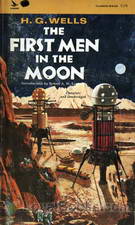 The First Men in the Moon
The First Men in the Moon
Written nearly seven decades before Neil Armstrong's historic “Giant leap for Mankind” this book by one of the most influential sci-fi writers in English is an interesting read. The First Men in the Moon by Herbert George Wells, the English author who is today called the Father of Science Fiction, describes a strange and fantastic voyage. Businessman and budding playwright, John Bedford takes a sabbatical from his work and decides to write a play. He moves to a lonely cottage in Kent where he hopes to come up with a theatrical masterpiece... | |
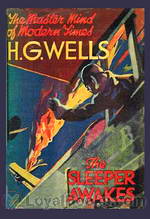 The Sleeper Awakes
The Sleeper Awakes
Originally serialized from 1898 to 1903, Wells later made some crucial changes to the piece to create a flawless dystopian science fiction novel published in 1910 and renamed The Sleeper Awakes. The novel focuses on an Englishman, who falls in a deep sleep lasting two centuries, and sees him wake up in an unrecognizable setting and extremely wealthy. An enthralling tale of dystopian society depicted through a colorful imagination, The Sleeper Awakes concentrates on topics including dystopia, political power, religion, plutocracy, and individual and social awakening... | |
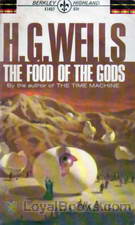 The Food of the Gods and How it Came to Earth
The Food of the Gods and How it Came to Earth
Two stuffy English scientists, always looking to further their scientific knowledge, create a substance called Herakleophorbia, which in its fourth incarnation – known as Herakleophorbia IV – has the special ability of making things increase greatly in size. As the scientists begin experimentation on some chicks, the substance is misused by some “country folk” who don’t take it seriously and soon Herakleophorbia IV is running rampant throughout England and then across the globe, creating giant plants and animals that wreak havoc on the land and then the people... | |
 Ann Veronica
Ann Veronica
Ann Veronica was a controversial book detailing the development of a naive school girl into a “New Woman”. When it was published, the Spectator described it as a “poisonous book … capable of poisoning the minds of those who read it.” Although it is unlikely to offend modern listeners in this way, this novel addresses many feminist issues that are still relevant today. | |
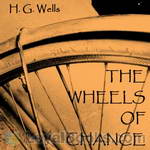 The Wheels of Chance
The Wheels of Chance
“The Wheels of Chance – A Bicycling Idyll” follows the adventures of a Drapers Assistant who, having brought an ancient bicycle, sets off on a 2 week tour of the countryside. He encounters a Lady in Grey wearing rationals (bloomers). And his world will never be the same again | |
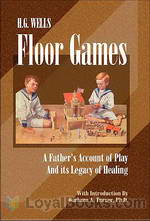 Floor Games
Floor Games
H.G. Wells had so much fun playing with his children on the floor of their playroom, he decided to write a jovial little book to inspire other parents in their pursuit of quality time with the kids. While the raw materials available from hobby stores of his day were woefully short of the variety and quality of what can be bought easily now, he and his sons created their own worlds to rule. This short work describes two games of imagination played out upon the floor of his home – an archipelago of islands, and a thoroughly integrated city, conveniently organized with two mayoral positions for his sons “G... | |
 A Story of the Stone Age
A Story of the Stone Age
This story is of a time beyond the memory of man, before the beginning of history. . . | |
 The War in the Air
The War in the Air
War in the Air was written during a prolific time in H. G. Wells's writing career. Having withdrawn from British politics to spend more time on his own ideas, he published twelve books between 1901 and 1911, including this one. while many British citizens were surprised by the advent of World War I, Wells had already written prophetically about such a conflict. War in the Air predicted use of airplanes in modern war. | |
 In the Days of the Comet
In the Days of the Comet
William ("Willie") is a student living in the British town of Clayton. As a Socialist, he tries to move power from the upper class to the working class. Interestingly, in a fictitious confrontation Britain declares war on Germany. Willie falls in love with Nettie, but when she elopes with an upper-class man, Willie resolves to kill them both. Throughout the novel there is present in the sky a large comet which gives off a green glow. As Willie prepares to shoot the lovers, two battleships appear and begin shelling the coast, causing Willie to nearly lose his targets... | |
 Tono-Bungay
Tono-Bungay
Tono-Bungay is a realist semi-autobiographical novel. It is narrated by George Ponderevo, a science student who is drafted in to help with the promotion of Tono-Bungay, a harmful stimulant disguised as a miraculous cure-all, the creation of his uncle Edward. The quack remedy Tono-Bungay seems to have been based upon the patent medicines Carter's Little Liver Pills and Dr. Williams' Pink Pills for Pale People.... As the tonic prospers, George experiences a swift rise in social status, elevating him to riches and opportunities that he had never imagined, nor indeed desired... | |
 The Secret Places of the Heart
The Secret Places of the Heart
Richard Hardy, a member of the British gentry, tries to resolve problems in his marriage as he travels with a psychiatrist. The book is to a great extent autobiographical. H. G. had read some brilliantly composed articles by a writer who wrote under the name Rebecca West. In one piece she called H. G. "pseudo-scientific." He contacted her and asked what she meant. When they met for lunch, it was the beginning of a very intense and volatile relationship. Soon she was pregnant, so he divided his time between her and his wife Jane with their two sons... | |
 Mr. Britling Sees It Through
Mr. Britling Sees It Through
"Mr. Britling Sees It Through" is H. G. Wells' attempt to make sense of World War I. It begins with a lighthearted account of an American visiting England for the first time, but the outbreak of war changes everything. Day by day and month by month, Wells chronicles the unfolding events and public reaction as witnessed by the inhabitants of one house in rural Essex. Each of the characters tries in a different way to keep their bearings in a world suddenly changed beyond recognition. This book was published in 1916 while the war was still in progress, so no clear resolution was possible... | |
 Passionate Friends
Passionate Friends
H. G. Wells is best known for his science fiction, but some of his greatest works were in other genres. The Passionate Friends is a love story. It also is a story about dreams, despair, jealousy, sex, the struggle against social convention, the future of civilization, and much much more. It is written by a father to his son, "not indeed to the child you are now, but to the man you are going to be." He writes it so that one day, perhaps when he is dead, his grown son can read it and rediscover him as a friend and equal... | |
 Dozen Short Stories from H. G. Wells
Dozen Short Stories from H. G. Wells
Twelve of H. G. Wells' early short stories originally printed in various magazines and papers. His earlier works delve into the human condition, looked at through a humorous lens. Love, romance, infidelity, parenthood and more are the subjects of the various stories, often told with a wry twist of humor. | |
By: H. L. Mencken (1880-1956) | |
|---|---|
 American Language
American Language
"It was part of my daily work, for a good many years, to read the principal English newspapers and reviews; it has been part of my work, all the time, to read the more important English novels, essays, poetry and criticism. An American born and bred, I early noted, as everyone else in like case must note, certain salient differences between the English of England and the English of America as practically spoken and written—differences in vocabulary, in syntax, in the shades and habits of idiom, and even, coming to the common speech, in grammar... | |
 Prejudices, First Series
Prejudices, First Series
Mencken sharpens his pen and in a collection of short essays delivers acerbic opinions on issues and persons of the time. Among his targets in this volume are critics, H.G. Wells Thorstein Veblen, Arnold Bennett, William Dean Howells, Irvin S. Cobb. Mencken's critiques are delivered against a background of his own well known ethnic, racial, religious, and sectional prejudices. Not for the faint of heart, Mencken's prickly, yet unapologetic, prose reveals a window into American attitudes at the time they were written and their influences on the larger American culture. - Summary by DrPGould | |
By: H. M. Egbert (1879-1960) | |
|---|---|
 Jacqueline of Golden River
Jacqueline of Golden River
Jacqueline seems to have contracted a touch of amnesia, as she is found in an apartment with a dead man, and with a weapon in her hand. But she remembers nothing of any incident, remembers not her name nor where she comes from, not even why she is where she was found. She only remembers her father, and that he is in danger. Action and adventure soon follow, as Paul Hewlett and Jacqueline attempt to get answers to her questions, taking them on a journey into Quebec and points northward, and Paul knows that they are being followed during their trip... | |
By: H. Rider Haggard (1856-1925) | |
|---|---|
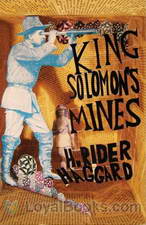 King Solomon's Mines
King Solomon's Mines
King Solomon’s Mines is the story of the leader Allan Quatermain and his adventurous group of followers on their mission to find the lost brother of an aristocrat, Sir Henry Curtis. Considered similar to Robert Louise Stevenson’s novel Treasure Island, Haggard’s book proved to be another must-read adventure novel in the international literary world. The African desert hides underneath its sands myths and legends that lasted for centuries in the minds of the locals. Quatermain has a mysterious map that could lead to the ancient mines of the wise King Solomon... | |
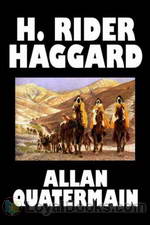 Allan Quatermain
Allan Quatermain
“An Adventurer – He that goes out to meet whatever may come!” This is the credo of Allan Quatermain, the quintessential, swashbuckling protagonist of Allan Quatermain by H. Rider Haggard. Quatermain first makes his appearance as a character in Haggard's most famous bestselling adventure tale, King Solomon's Mines. Published in 1885, this Victorian action novel depicts a group led by Allan Quatermain who travel to a remote region in Africa in search of the missing brother of one of them. It is considered the very first English adventure tale set in what was perhaps disparagingly then called the “Dark Continent... | |
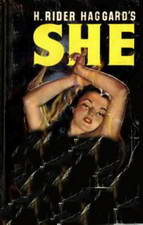 She
She
A timeless classic of fantasy literature, She is recognized as the groundwork for the lost world literary sub- genre. First published serially in The Graphic magazine from 1886 to 1887, the novel has reached critical acclaim with approximately 100 million copies sold and is regarded as one of the best-selling books of all time. Exploring themes of imperialism, lost civilization, female authority and psyche, the novel also serves as a mirror to reflect Victorian issues such as gender and race. ... | |
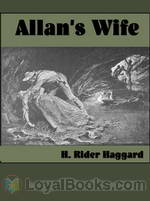 Allan's Wife
Allan's Wife
The story of Allan Quatermain's wife and further adventures of Allan Quatermain. | |
 Allan and the Holy Flower
Allan and the Holy Flower
Further adventures of Allan Quatermain | |